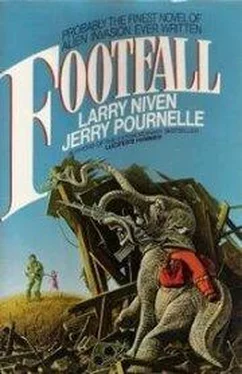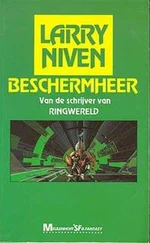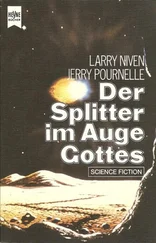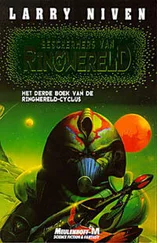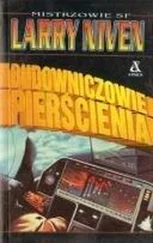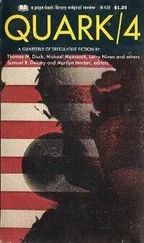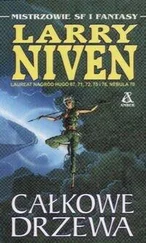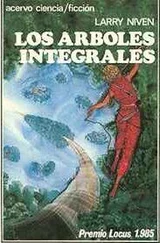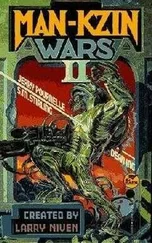His feeling of great weight continued as the Shuttle main engines continued to burn. He’d been told they developed over a hundred horsepower per pound. Wes Dawson tried to imagine that, but the image that came to mind was silly.
He noticed the roar fading, and then the weight easing from his body. Silence and falling. Black sky and the blue-white arc of planet Earth, and Wes Dawson had reached space at last.
Ed Gillespie went out first. Wes waited impatiently while Gillespie helped the Soviet crewmen rig tether lines between the Shuttle and the Soviet Kosmograd space station. The Shuttle was far too large to dock with the Soviet station; at least that was the official reason they’d been given.
Finally the work was done, and it was Dawson’s turn in the airlock. Captain John Greeley, Wes’s escort and aide, waited behind him to go last. Ed Gillespie would be waiting outside. Ed must hate this a lot. Greeley and! go aboard Kosmograd. Ed takes the Shuttle home. Enough of that.
Wes ran through the pressure-suit checklist once more. The small computer-driven display at his chest showed all green, and Wes touched the Airlock Cycle button. He heard a faint whine.
He moved very cautiously. There was nothing out there but vacuum. High school physics classes and the science fiction he’d read in his teens spoke their lessons in his memory: space is unforgiving, even to a powerful and influential congressman. He listened to the dwindling hiss as the airlock emptied; none of it was coming from his million dollars’ worth of pressure suit. He’d done it right.
The hiss and whine faded to nothing. Then the airlock display blinked green over red. In the back of his throat was nausea waiting to pounce. His semicircular canals danced to strange rhythms. High school physics be damned: his body knew he was falling. Skydiving wasn’t like this. Skydiving, you had the wind; if you waited a few seconds the wind stopped your acceleration, and it was as if you were being buoyed up. Here there was only the oxygen breeze in your face.
The outer door opened and the universe hit him in the face.
The Soviet station was a winged hammer that tumbled as it flew. At one end of the long, long corridor that formed the handle, three cylinders, born as fuel tanks, nestled side by side. The living quarters must have been expanded since the structure was built. There were few windows, and all were tiny. Not much of a view from in there. Best do my sightseeing while I’m outside.
Solar-electric panels splayed out around the other end of the corridor. Dawson guessed there was a nuclear plant too, well isolated from the crew quarters. Why else would the joining corridor be so long? Though it would help the Sovs maintain spin gravity.
At the center of rotation, opposite a fourth tank that served as a free-fall laboratory, was the main airlock. A line ran from the airlock to the hovering shuttlecraft. And behind it all, a great blue ball was slowly traversing a deep black sky.
Orbit! Free-fall! He’d done it! But what a strange path he’d traveled,
There was a boy who had wanted to be an astronaut.
A young man had watched that hope dwindle as he matured. Men had landed on the Moon in July of 1969, after eight years of effort. In 1980, a NASA official had stated that “the United States could not reach the Moon again ten years from now, no mailer what the effort.” The space program had been nearly dismantled. The United States had reached the Moon… and come back… and stopped.
The Soviets, beaten in the Moon race, dropped out; but when the United States rested, the Soviet space program began anew, this time systematically developing capabilities, each new exploit a bit more difficult than the last; none of the spectaculars of the early days, but plenty of solid achievement.
An angry man had grown into politics. Partly through Wes Dawson’s efforts, the U.S. space program began again, led by the Shuttle and continuing toward industries in space, but too slowly.
The cold war began again, with all its implications. Editorials in U.S. papers and on television: why challenge the Soviets in space? Nothing was there. Or, alternatively: the Soviets are so strong that they cannot be challenged. Or: why begin a race no one can win? A drumfire of editorials, threatening to drown the American space effort.
Then had come a speck in the night sky; and a powerful, determined politician in the best of health now looked across thirty meters of line at a Soviet space station to which he had come as visiting dignitary.
It was a way into space; but he’d have had to be crazy to plan it that way…
“Do you feel all right, Congressman?’ The Soviet crewman waited outside, clinging to a handhold on the airlock door. He floated easily, his whole posture a statement: for Soviets this is easy. We have the experience to make it easy.
He couldn’t see the expression behind the darkened glass of Ed Gillespie’s helmet. Gillespie waited.
“I’m fine! Fine!” Wes stayed uncertainly in the airlock. Space was wonderful, but there was so much of it! He felt bouncy, happy; he sounded that way too.
“Good.” The cosmonaut pushed into Dawson’s glove a device vaguely resembling pliers; the business end was already closed around the line. “If you will move out of the airlock—”
Wes grasped the line grip and moved out of the airlock door. Ed Gillespie came up beside him. Gillespie said nothing, but Wes was grateful: someone familiar, in this strange and wonderful place.
The airlock cycled again, and Greeley emerged. The cosmonaut handed him a line gripper. “Remember, there is no way to get lost. You need only jump. When you near the airlock, squeeze the handle and friction will slow you.” The Russian’s accent was noticeable even through the electronics of the suit radios.
“Fine.” They’d showed him most of it in briefings, but it wasn’t the same.
“You’re on your own, then,” Ed Gillespie said. “See you in Houston.” He clapped Wes on the shoulder and climbed into the airlock.
“Right. My regards to Linda.” he spoke automatically. He was watching the Soviet cosmonaut. Dawson took a deep breath.
The Russian jumped.
Dawson waited until the Soviet was across before he moved. It took nerve, for a man who was already falling. A good jump maybe a bit too hard…, airlock coming up fast…, he wasn’t slowing at all! Dawson braked too soon, left himself short of the airlock.
Greeley thumped into him from behind. Greeley was massive:
an Air Force Captain who had earned his letter in football as a halfback. His cheerful voicewas a bit tinny in Wes’s earphones. “No sweat. Sir, if you’ll just ease up on the clamps—” Wes relaxed his grip, releasing the line, and let Greeley guide him into the airlock.
Several people waited beyond the airlock. One was a woman in her forties. A legless man floated toward Wes and deftly helped him to remove his helmet. No one spoke.
“Hi!” Wes said.
“Hello.” The woman spoke grudgingly.
The airlock opened, and the Soviet cosmonaut entered. The legless man assisted him in opening his helmet. The cosmonaut grinned. “Welcome to Kosmograd. I am Rogachev.”
“Ah! Thank you,” Wes said. “I hadn’t expected the commander himself to assist me—”
“I enjoy going outside,” Rogachev said. “I have all too few opportunities.”
The others seemed friendlier now.
“Allow me to introduce you, but quickly,” Rogachev said. “When we have removed these suits, you can be more properly Welcomed. This is First Deputy Commander Aliana Aleksandmvna Thtsikova. Deputy Commander Drnitri Parfenovich Gru shin. Station Engineer Ustinov.”
These three were lined up, Tutsikova closest to Wes. They all looked typically Russian to Dawson’s untrained eye. There were three more in the crowded corridor, including the legless man, but Rogachev made no move to introduce them.
Читать дальше
